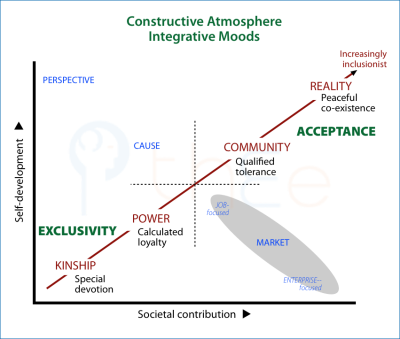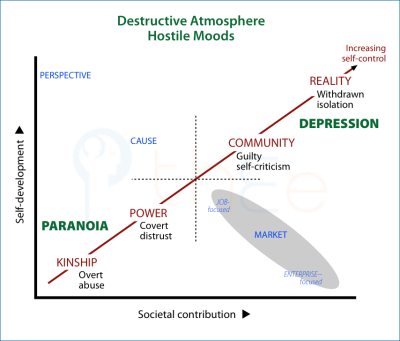Mental States 3: Social Bonds
Moods & their Impact

The four well-being mentalities activate personal moods and social atmospheres, which affect personal relationships and social bonds:
- Constructive moods create a welcoming atmosphere and foster integration
- Destructive moods engender hostility and lead to divisions or ruptures.
The effect in the Reality-centred & Community-centred (upper-right quadrant) occurs within larger groups and wider society; while the effect in the Kinship-centred & Power-centred (lower-left quadrant) occurs within small groups.
It can be a thin line between exclusivity (positive) and paranoia (negative), & between acceptance (positive) and depression (negative).
Constructive Moods: Integration
Moving up the diagonal, these mentalities become increasingly inclusive of individuals and groups.
 Exclusivity Bonds Individuals
Exclusivity Bonds Individuals
-
Kinship-centred individuals view family members as special, and tend to be distant but polite with non-family.
More on integration: Family members are automatically mutually supportive with close kin devoted to each other. Relatives value loyalty irrespective of merit or social conventions. For example, they shield each other from the law, and lend each other money without collateral; and nepotism seems natural.
Family members are automatically mutually supportive with close kin devoted to each other. Relatives value loyalty irrespective of merit or social conventions. For example, they shield each other from the law, and lend each other money without collateral; and nepotism seems natural.
Rejection follows, however, if a family tradition is violated: a member may then be permanently disowned and cast out.
-
Power-centred individuals form tight supportive exclusive cliques and are reluctant to admit newcomers.
More on cohesion: Loyalty between individuals and their clique is expected and required. Accounts are kept mentally of what favours or support have been provided, with indebtedness creating a one-down position. This leads to cronyism i.e. «it isn’t what-you-know, but who-you-know».
Loyalty between individuals and their clique is expected and required. Accounts are kept mentally of what favours or support have been provided, with indebtedness creating a one-down position. This leads to cronyism i.e. «it isn’t what-you-know, but who-you-know».
Rejection follows, however, if loyalty is not rewarded or if debts (money/favours) are not re-paid: and there may be retribution. Leaving the group («breaking away») may be viewed as a betrayal and can lead to revenge.
 Acceptance Bonds Society
Acceptance Bonds Society

-
Community-centred individuals show a tolerance, which enables widespread participation, democracy, cooperation and sharing.
Qualifications: Acceptance is qualified by expectations on everyone to be of service to the social group or community and to accept consensus views with good grace.
Acceptance is qualified by expectations on everyone to be of service to the social group or community and to accept consensus views with good grace.
Rejection follows from anti-social behaviour, although a blind eye may be turned to such activities to maintain unity.
-
Reality-centred individuals accept others as part of their own identity. Awareness and tolerance of one’s own limitations helps maintain equanimity and a constructive mood.
Philosophy: The principle adopted is to «accept the unacceptable» and live peaceably with diversity.
The principle adopted is to «accept the unacceptable» and live peaceably with diversity.
Rejection of antisocial individuals may be required in practice, but efforts to contain, educate, mitigate and forgive are pursued. Constructive outcomes are developed by skilfully re-framing and re-formulating the situation.
Destructive Moods: Hostility
Moving up the diagonal, these mentalities show an increasing capacity for self-control.
 Hostility to Individuals breeds Paranoia
Hostility to Individuals breeds Paranoia
-
Kinship-centred individuals are susceptible to extremes of jealousy, envy and even hatred within the family. At a mild level, family life may foster irrational suspicion, tantrums, moroseness, teasing, nagging and complaining. More severe states involve persistent emotional, physical and sexual abuse, even murder.
Projection: Outsiders may also be suspected and distrusted, but it requires inputs of racism and religion, both kinship derivatives, to justify overtly hate-filled attacks based on the projection of negative attributes.
Outsiders may also be suspected and distrusted, but it requires inputs of racism and religion, both kinship derivatives, to justify overtly hate-filled attacks based on the projection of negative attributes.
-
Power-centred individuals can come to distrust everyone, even their supporters, whom they suspect of rivalry and disloyalty.
Factions and gangs regularly declare war on each other over territory, spoils or insults: but this is business as usual. The problem occurs when distrust builds within the group. Distrust is then diplomatically hidden and hostility is released silently via passive-aggressive techniques susceptible to denial.
Projection: If paranoia is not kept under control, a readiness to exploit others, to scheme and to stab people in the back comes back to haunt the person. Power-battles then escalate within the faction, to become intense, divisive and self-destructive.
If paranoia is not kept under control, a readiness to exploit others, to scheme and to stab people in the back comes back to haunt the person. Power-battles then escalate within the faction, to become intense, divisive and self-destructive.
 Hostility to Society breeds Depression
Hostility to Society breeds Depression
-
Community-centred individuals naturally become angry about the suffering and injustice within society. But they internalise their hostility and as a result feel responsible and guilty: taken too far, this produces depression.
Burn-Out:  A refusal to accept limitations, combined with self-criticism, can lead to re-doubled efforts to help. In the absence of success burn-out eventually results, with psychological collapse and often physical illness.
A refusal to accept limitations, combined with self-criticism, can lead to re-doubled efforts to help. In the absence of success burn-out eventually results, with psychological collapse and often physical illness.
-
Reality-centred individuals can also become angry, but because the reality of the situation is perceived, the response is disapproval and distancing. A depressive withdrawal from the unpleasant situation, both in thought and in actuality, reduces inner feelings of rage and hostility.
Isolation: Withdrawal, based on acceptance rather than denial, can spiral into self-isolation. This is intrinsically negative and prevents any further social contribution.
Withdrawal, based on acceptance rather than denial, can spiral into self-isolation. This is intrinsically negative and prevents any further social contribution.
Originally posted: July 2009


![]() Hostility to Individuals breeds Paranoia
Hostility to Individuals breeds Paranoia
![]() Hostility to Society breeds Depression
Hostility to Society breeds Depression